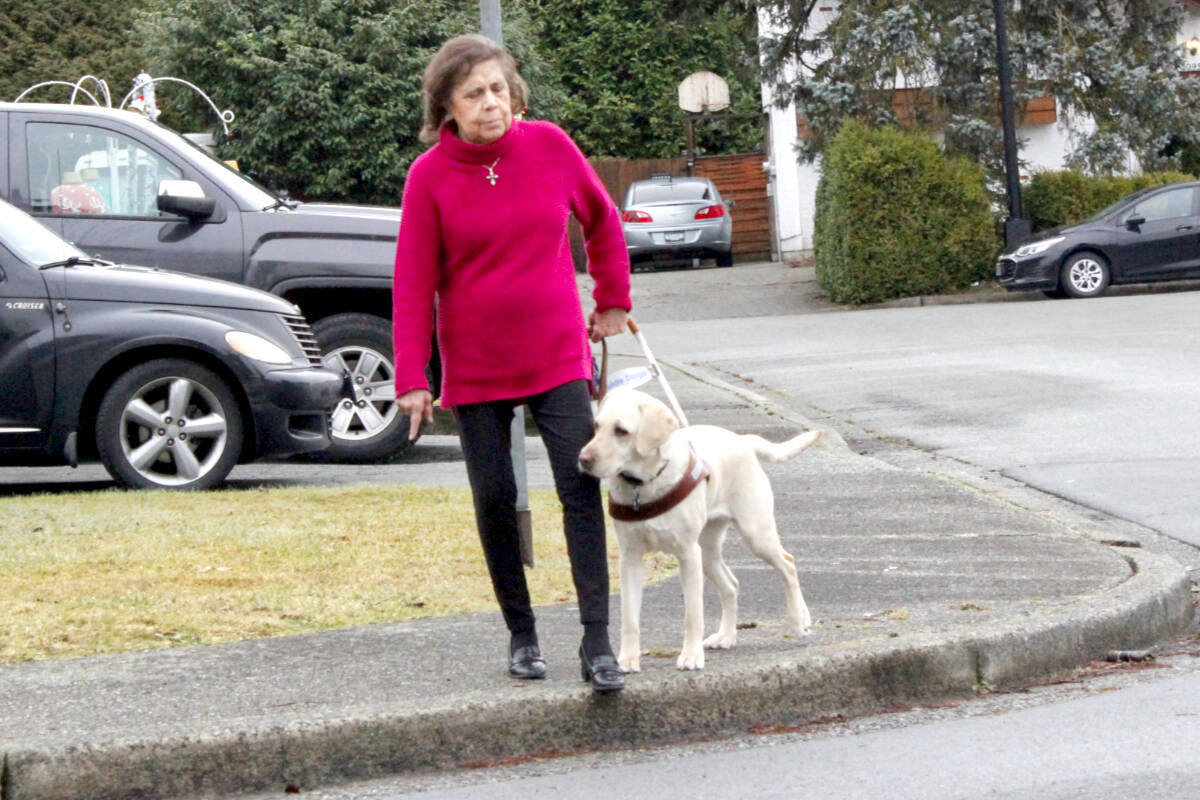The City of Maple Ridge will not be appealing its losses in a BC Human Rights Tribunal case brought against the city by a blind resident.
“I’m very pleased, even though it’s one-third of what I asked for,” said Maria Kovacs, who was 72 at the time of her hearing in January 2023.
She has been awarded $35,000, and the city ordered to remediate a local intersection based on her complaints, which were first made in 2018.
“I love walking – I don’t have a choice,” she said. “I don’t want to lose that freedom, but it gets a little more scary.”
Kovacs is a longtime member of the city’s Municipal Advisory Committee on Accessibility and Inclusiveness (MACAI), on and off for 25 years, and hopes she will be able to once again have a voice in these issues in the city.
“A lot of my independence has been taken by how they constructed the bike lanes,” she said, but clarified she is not against bike lanes, and in the past rode a tandem bike with a sighted person.
Kovacs first raised her issues in August of 2018, claiming that as a blind person with a guide dog, she was not able to navigate safely in her neighbourhood. She said changes at intersections creating traffic circles and bike lanes did not accommodate the visually impaired.
READ ALSO: Maple Ridge city council begins budget process
On Oct. 13, the Tribunal ruled the city should pay Kovacs $35,000, for “injury to her dignity,” and make changes at one intersection – at Dewdney Trunk Road and 203rd Street. A city lawyer recently informed her it will not appeal the decision, she said.
Kovacs’ case cited three areas:
• Dewdney Trunk Road and 203rd Avenue, including the pedestrian crossings at the intersection and a northbound bus stop on 203rd Avenue, immediately north of Dewdney Trunk Road
• Creston Avenue and 123rd Street
• Two roundabouts at 232nd Street at 132nd Avenue. The two roundabouts are separated by a bridge over the North Alouette River.
Her complaints included unsafe road crossings, potential conflicts with cyclists, limited space for pedestrians, and lanes marked by lines she can’t detect.
The other areas of complaint were dismissed.
Kovacs said the city has people on MACAI who have mobility issues, but has lacked input from the blind.
“My needs and those of a person in a wheelchair are not the same,” she said.
She said there are many “situations” around the city that should be addressed with the visually impaired, and their guide dogs, in mind.
A city spokesperson said while the case worked its way through BC Human Rights Tribunal the city continued to review the areas noted in the original complaint and to proactively apply changes based on information shared in the hearing.
The city is moving forward in good faith to address the findings and recommendations from the ruling, said the statement from spokesperson Fred Armstrong, adding the city is committed to building infrastructure that serves the needs of the widest range of people of all ages and abilities while balancing complex and competing interests and technical issues. The city follows accepted rules, guidelines, and best practices in B.C. and Canada to ensure consistency in approaches across the region so that visually impaired citizens are provided with facilities that meet the circumstances and standards they are familiar with using. The city is working with a mobility consultant to ensure that the concerns outlined in the tribunal ruling are dealt with.
READ ALSO: Blind woman partly wins human rights complaint against Maple Ridge

